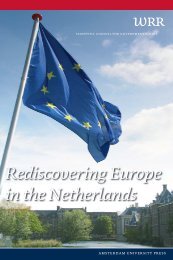The Western Condition - St Antony's College - University of Oxford
The Western Condition - St Antony's College - University of Oxford
The Western Condition - St Antony's College - University of Oxford
Create successful ePaper yourself
Turn your PDF publications into a flip-book with our unique Google optimized e-Paper software.
Faces <strong>of</strong> the West: Can Europeanisation, Americanisation and Autonomisation be reconciled?<br />
countries further together. 182 <strong>The</strong> Turkish government has also expressed solidarity with the<br />
Greek people and pledged to ease bureaucratic red tape to encourage the continued growth <strong>of</strong><br />
trade and investment ties. Such meaningful gestures, however, risk being undermined by the<br />
imperialistic undertones <strong>of</strong> the AKP’s foreign policy rhetoric in the Balkans, where repeated<br />
references to the Ottoman Empire targeting the region’s Muslim populations cause suspicion<br />
and alarm among non-Muslims, including in Greece. A more humble narrative that does not<br />
invoke historical differences is likely to go further in helping Turkey become a trusted partner <strong>of</strong><br />
all actors in this region.<br />
Finally, and relatedly, both Turkey and the EU can benefit from increased cooperation in their<br />
shared neighbourhoods, particularly in the Middle East in the midst <strong>of</strong> the Arab uprisings.<br />
Interestingly, while Turkey has recently come out on top in most surveys exploring Arab<br />
perceptions <strong>of</strong> regional actors, the EU, for all its economic woes, tends to be a close second. 183<br />
In spite <strong>of</strong> the financial crisis, the EU continues to wield significant ‘s<strong>of</strong>t power’ influence over a<br />
wide and diverse terrain, which will become increasingly relevant in the long term, as economic<br />
issues remain the top priority for a majority <strong>of</strong> the region’s populations. 184 Whatever shifting<br />
alliance patterns in the short term, both the EU and Turkey strive to influence this diverse<br />
region as a whole primarily through the ‘s<strong>of</strong>t power’ tools at their disposal, i.e. by, economic,<br />
cultural and civil society ties through public and private initiatives. On its end, the EU has<br />
repeatedly tried to adapt its Euro-Mediterranean Partnership (or Barcelona Process) started in<br />
1995, to changing circumstances in the region. Relaunched in 2008 as the Union for the<br />
Mediterranean (UfM) encompassing 43 countries from Europe and the Mediterranean Basin, the<br />
new setting provides a good intentioned project based framework (eg. water pollution etc). But it<br />
has certainly not lived up to the vision <strong>of</strong> all those who dream <strong>of</strong> a Mediterranean revival, <strong>of</strong>ten<br />
reverting to a bilateral logic as its multilateral dynamic was regularly broken by the unresolved<br />
conflicts in its mists (Arab-Israeli, Cyprus-Turkish and <strong>Western</strong> Sahara). This is true even for<br />
concrete, a-political goals like the Euro-Mediterranean Free Trade Area (EMFTA) by 2010. 185 To<br />
182 This is demonstrated by the fact that the number <strong>of</strong> tourists from Turkey increased significantly during summer<br />
2012 when the Greek government eased visa restrictions for Turkish citizens traveling to the Greek islands, despite<br />
the fact that overall tourist arrivals into Greece dwindled. In 2010, the lifting <strong>of</strong> visa requirements for Turkish<br />
special passport holders led to a 180 percent increase in the number <strong>of</strong> Turks visiting Greece. ‘Greek minister calls<br />
for cooperation with Turkey’, Hurriyet Daily News, 2 July 2012; ‘Turk tourists flock to Greek islands’, Hurriyet Daily<br />
News, 28 July 2012.<br />
183 ‘Euro-Mediterranean Policies and the Arab Spring’, Euromed Survey <strong>of</strong> Experts and Actors 2011, European Institute<br />
<strong>of</strong> the Mediterranean, Barcelona, 2012<br />
184 47% <strong>of</strong> the respondents to the 2012 TESEV survey indicated economic issues as “the most urgent issue facing<br />
the respondent’s country”. This was followed by security issues with 9%.<br />
185 <strong>The</strong> signing <strong>of</strong> a customs union agreement with Turkey in 1995 was an important stepping stone for both sides.<br />
<strong>The</strong> Agadir Agreement <strong>of</strong> 2004 (a free trade agreement between Jordan, Tunisia, Morocco and Egypt) has<br />
contributed to the expansion <strong>of</strong> the Greater Arab Free Trade Area in coordination with the ENP under the shared<br />
goal <strong>of</strong> creating a single Euro-Mediterranean free trade zone by 2010. For the initiative’s shortcomings and future<br />
prospects, see Nicolas Péridy and Nathalie Roux, ‘Why are the Trade Gains from the Euro-Mediterranean<br />
Partnership so Small?’, Journal <strong>of</strong> World Trade, 46 (3), June 2012, pp. 571 – 595; Ege Aylin, ‘Euro-Mediterranean Free<br />
68

















